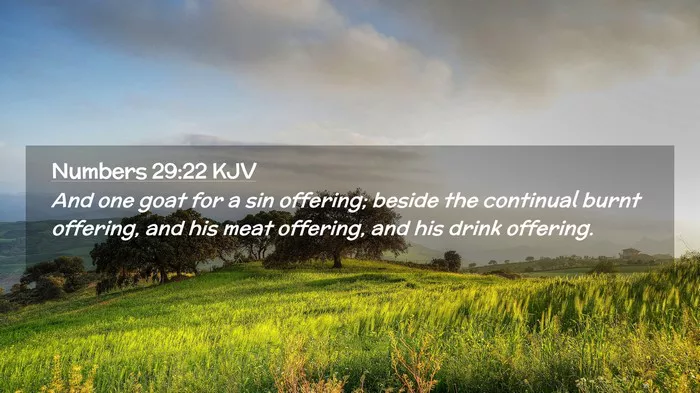Read the Daily Bible Verse – Numbers 29:22 To Strengthen Your Spiritual Journey.
The Context of Numbers 29:22 (KJV)
Overview of Numbers 29
The Book of Numbers, the fourth book of the Bible, records the journey of the Israelites through the wilderness after their exodus from Egypt. It includes various laws and instructions given by God to Moses, particularly concerning worship and offerings.
Chapter 29 details the offerings to be made during the seventh month, which includes several significant festivals:
- Feast of Trumpets (1st day)
- Day of Atonement (10th day)
- Feast of Tabernacles (15th to 22nd day)
Each festival had specific sacrificial requirements, emphasizing the importance of obedience and reverence in worship.
The Feast of Tabernacles
The Feast of Tabernacles, also known as Sukkot, was a week-long celebration commemorating the Israelites’ 40-year journey in the wilderness. It was a time of rejoicing and thanksgiving for God’s provision. Each day of the feast had prescribed offerings, which decreased in number as the days progressed, symbolizing various aspects of Israel’s relationship with God.
Numbers 29:22 (KJV)
“And one goat for a sin offering; beside the continual burnt offering, and his meat offering, and his drink offering.”
This verse specifies the additional offerings to be made on the fifth day of the Feast of Tabernacles.
Numbers 29:22 Meaning
The Sin Offering
The “one goat for a sin offering” was a crucial part of the sacrificial system. Sin offerings were made to atone for unintentional sins and to restore the individual’s relationship with God. The use of a goat symbolizes the transfer of sin from the people to the animal, which is then sacrificed, signifying the removal of sin.
The Continual Burnt Offering
The “continual burnt offering” refers to the daily sacrifices made every morning and evening, as commanded in Numbers 28:3-8. These offerings were a constant reminder of Israel’s dedication to God and their need for atonement.
Meat and Drink Offerings
The “meat offering” (more accurately, grain offering) and “drink offering” accompanied the burnt offerings. The grain offering consisted of fine flour mixed with oil, and the drink offering was wine. These offerings symbolized the people’s gratitude for God’s provision and their dependence on Him.
Integration of Offerings
The inclusion of the sin offering alongside the daily burnt, grain, and drink offerings underscores the comprehensive nature of Israel’s worship. It wasn’t just about atonement but also about thanksgiving, dedication, and recognition of God’s continual blessings.
Numbers 29:22 Application in Life
Recognizing the Need for Atonement
The sin offering highlights the seriousness of sin and the necessity of seeking forgiveness. In our lives, it’s essential to acknowledge our shortcomings and seek reconciliation with God. This verse reminds us of the importance of repentance and the provision God has made for our atonement through Jesus Christ.
Consistent Worship
The continual burnt offering signifies the importance of regular and consistent worship. Just as the Israelites had daily sacrifices, we are encouraged to maintain a daily relationship with God through prayer, reading Scripture, and living out our faith.
Gratitude for Provision
The grain and drink offerings were expressions of gratitude. In our daily lives, we should recognize and thank God for His provision, both materially and spiritually. Cultivating a heart of gratitude enhances our relationship with God and others.
Holistic Worship
The combination of offerings in this verse teaches us that worship is multifaceted. It’s not just about seeking forgiveness but also about expressing gratitude, dedicating ourselves to God, and recognizing His continual presence in our lives.
Conclusion
Numbers 29:22, while detailing specific sacrificial practices, offers profound insights into the nature of worship and our relationship with God. It emphasizes the need for atonement, the importance of consistent and holistic worship, and the expression of gratitude for God’s provision. As we reflect on this verse, we’re reminded of the comprehensive nature of our devotion to God and the ways we can embody these principles in our daily lives.
You Might Be Interested In:


